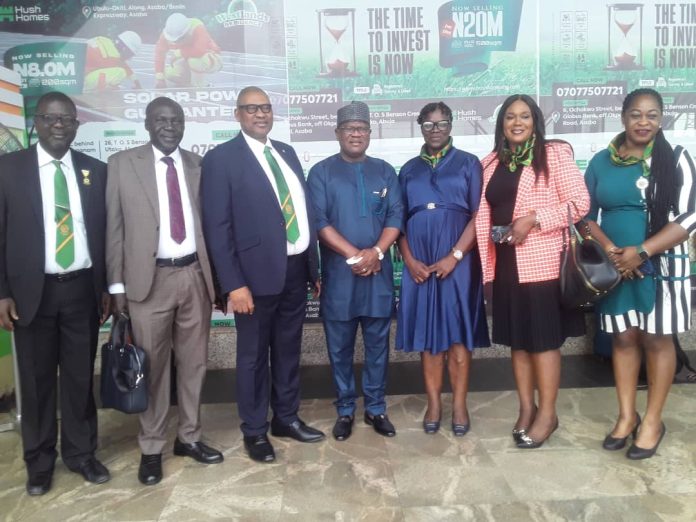...Presents Award To Asagba Of Asaba
President of Chartered Institute of Bankers of Nigeria (CIBN) and Chairman of Council, Prof. Pius Deji Olanrewaju is currently in Delta State on an official visit, saying on arrival at the Asaba International Airport, yesterday, that among the reasons for the visit is to close gap with CIBN branches nationwide.
He was received on arrival at the airport by Chairman of CIBN, Delta State Branch, Barr. Charles Ojakovo, the 1st Vice Chairman, Mr. Amaechi Bayem, Mr. Joe Okolie, the Manager of Keystone Bank in Asaba, Faith Omasan Edon, Scholastica Moemeke, Oji Ogbonnaya, among others.
Speaking to journalists on arrival, Olanrewaju said “this is my second official visit to Asaba. The reason for coming is very clear. I came in on the 17th of May, 2024 as the 23rd President and Chairman of Council. I came in with a legacy agenda and one of the key issues is the need to build an Institute that is all-inclusive. The ‘G’ in that legacy agenda means Gender, Generational and Geographical diversity and to realize this, we need to know what is happening in our branches. I assured that on my assumption as President, I would touch all the branches to ensure they have a feel of what is going on at the national level. I’m pleased to meet them, lively and all looking well-dressed and it means that banking is thriving here.
“We wanted to ensure that capable hands are in charge in all the branches and Asaba has demonstrated good leadership, in the way they organize events, interact with the head office and respond to issues that are of common interest. I therefore refer to Asaba as one of the tiger branches of the CIBN.
“When you visit, you will be able to see things for yourself. With this kind of visit, we will be able to interact and discuss the challenges. In some of these challenges, I believe there are opportunities”, he said.
Olanrewaju later visited the Chief Economic Adviser to the Governor, Dr. Barry Gbe, a CIBN member, saying that “my joy knew no bounds when I learnt that our members are in positions of authority in the state, while he commended Gbe for making an office space available for use by the branch.
Dr. Barry Gbe, on his part, said that he considered the visit to be a privilege, while thanking the CIBN president for coming.
Ojakovo then solicited for land from the state government to enable it build a CIBN secretariat in Asaba, given the assurance of the National president that the Institute will ensure that a secretariat is built in any state branch that makes land available.
Olanrewaju and the branch chairman and members also visited the 14th Asagba of Asaba, HRM, Obi (Prof.) Epiphany Azinge in his palace. Olanrewaju, who is a law lecturer, recalled Azinge’s time at the Nigerian Institute of Advanced Legal Studies (NIALS), describing it as a great era for the institution. Likewise, he prayed that Azinge’s reign as Asagba of Asaba will produce a great era for Asaba people.
He later presented an award of excellence to the Asaba monarch on behalf of Council.
Earlier, Olanrewaju spoke on the Annual CIBN Delta State Branch Lecture on December 7 at Orchid Hotel, DBS road, Asaba by 11am and Awards/Dinner by 6pm at the same venue. It has the theme “Policies and Roles of CBN and Financial Institutions in Supporting MSMEs and FGN’s Grow Nigerian Project to achieve Economic Growth and Stability.” Olanrewaju proposed ways to revitalize MSMEs such as increased financial support, electricity and infrastructure provision, among other aids to bail out the MSMEs.
The keynote address will be delivered by the Executive Secretary, Delta State Micro, Small and Medium-scale Enterprises Development Agency (DEMSMEDA), Dr. Godwin Adolor, while the guest speaker is the MD/CEO of Amju Unique Microfinance Bank, Dr. Jonathan Ososuakpor.
Ojakovo concluded that “banks need to come and tell MSMEs what they are doing, why are they not lending to MSMEs and at what rate. I expect the MSMEs across Delta State to come and engage with the banks on different issues agitating their minds, so that together we all can find a way forward because MSMEs are critical to the country’s economic growth and stability.”


